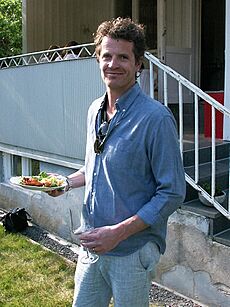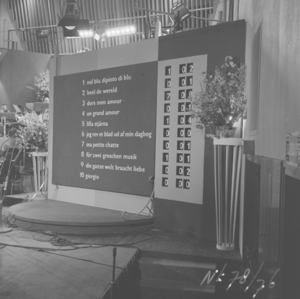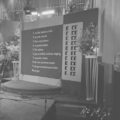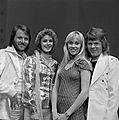Eurovision Song Contest facts for kids
Quick facts for kids Eurovision Song Contest |
|
|---|---|

Logo since 2015
|
|
| Genre | Music competition |
| Created by | European Broadcasting Union |
| Based on | Sanremo Music Festival |
| Presented by | Various presenters |
| Country of origin | Various participating countries |
| Original language(s) | English and French |
| No. of episodes |
|
| Production | |
| Production location(s) | Various host cities |
| Running time |
|
| Production company(s) | European Broadcasting Union Various national broadcasters |
| Release | |
| Original release | 24 May 1956 – present |
| Chronology | |
| Related shows |
|
The Eurovision Song Contest (French: Concours Eurovision de la chanson), often known simply as Eurovision or by its initialism ESC, is an international song competition organised annually by the European Broadcasting Union. Each participating country submits an original song to be performed live and transmitted to national broadcasters via the Eurovision and Euroradio networks, with competing countries then casting votes for the other countries' songs to determine a winner.
The contest was inspired by and based on Italy's national Sanremo Music Festival, held in the Italian Riviera since 1951. Eurovision has been held annually since 1956 (apart from 2020 due to the COVID-19 pandemic), making it the longest-running international music competition on television and one of the world's longest-running television programmes. Active members of the EBU and invited associate members are eligible to compete; as of 2023[update] 52 countries have participated at least once. Each participating broadcaster sends one original song of three minutes duration or less to be performed live by a singer or group of up to six people aged 16 or older. Each country awards 1–8, 10 and 12 points to their ten favourite songs, based on the views of an assembled group of music professionals and the country's viewing public, with the song receiving the most points declared the winner. Other performances feature alongside the competition, including a specially-commissioned opening and interval act and guest performances by musicians and other personalities, with past acts including Cirque du Soleil, Madonna, Justin Timberlake, Mika, Rita Ora and the first performance of Riverdance. Originally consisting of a single evening event, the contest has expanded as new countries joined (including countries outside of Europe, such as Israel and Australia), leading to the introduction of relegation procedures in the 1990s, before the creation of semi-finals in the 2000s. As of 2023[update] Germany has competed more times than any other country, having participated in all but one edition, while Ireland and Sweden both hold the record for the most victories, with seven wins each in total.
Traditionally held in the country which won the preceding year's event, the contest provides an opportunity to promote the host country and city as a tourist destination. Thousands of spectators attend each year, along with journalists who cover all aspects of the contest, including rehearsals in venue, press conferences with the competing acts, in addition to other related events and performances in the host city. Alongside the generic Eurovision logo, a unique theme is typically developed for each event. The contest has aired in countries across all continents; it has been available online via the official Eurovision website since 2001. Eurovision ranks among the world's most watched non-sporting events every year, with hundreds of millions of viewers globally. Performing at the contest has often provided artists with a local career boost and in some cases long-lasting international success. Several of the best-selling music artists in the world have competed in past editions, including ABBA, Celine Dion, Julio Iglesias, Cliff Richard and Olivia Newton-John; some of the world's best-selling singles have received their first international performance on the Eurovision stage.
While having gained popularity with the viewing public in both participating and non-participating countries, the contest has also been the subject of criticism for its artistic quality as well as a perceived political aspect to the event.
Contents
Rules
The contest is organised annually by the European Broadcasting Union (EBU), together with the participating broadcaster of the host country. The event is monitored by an Executive Supervisor appointed by the EBU, and by the Reference Group which represents all participating broadcasters, who are each represented by a nominated Head of Delegation. The current Executive Supervisor is Martin Österdahl, who took over the role from Jon Ola Sand in May 2020. A detailed set of rules is written by the EBU for each contest and approved by the Reference Group. These rules have changed over time, and typically outline, among other points, the eligibility of the competing songs, the format of the contest, and the voting system to be used to determine the winner and how the results will be presented.
Song eligibility and languages
All competing songs must have a duration of three minutes or less. This rule applies only to the version performed during the live shows. In order to be considered eligible, competing songs in a given year's contest must not have been released commercially before the first day of September of the previous year. All competing entries must include vocals and lyrics of some kind, a cappella songs and purely instrumental pieces are not allowed. Competing entries may be performed in any language, be that natural or constructed, and participating broadcasters are free to decide the language in which their entry may be performed.
Rules specifying in which language a song may be performed have changed over time. No restrictions were originally enacted when the contest was first founded; however, following criticism over the 1965 Swedish entry being performed in English, a new rule was introduced for the 1966 contest restricting songs to be performed only in an official language of the country it represented. This rule was first abolished in 1973, and subsequently reinstated for most countries in 1977, with only Belgium and Germany permitted freedom of language as their selection processes for that year's contest had already commenced. The language rule was once again abolished ahead of the 1999 contest.
There is no restriction on the national origin, country of residence or age of the songwriter(s). Furthermore, unlike performers who may only represent one country in any given year, songwriters are free to enter multiple songs in a single year sung by different acts. For example in the 1980 edition both Germany's and Luxembourg's entry were (co-)written by Ralph Siegel who – in a career spanning over forty years – was involved in some form in the writing of dozens of entries — both advancing to the grand final and failing to make it past the national selection and including the winning entry in 1982.
Artist eligibility and performances
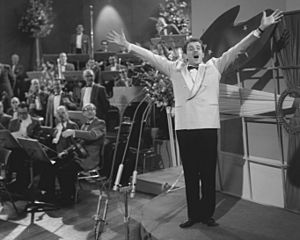
The rules for the first contest specified that only solo performers were permitted to enter; this criterion was changed the following year to permit duos to compete, and groups were subsequently permitted for the first time in 1971. Currently the number of people permitted on stage during competing performances is limited to a maximum of six, and no live animals are allowed. Since 1990, all contestants must be aged 16 or over on the day of the live show in which they perform. Sandra Kim, the winner in 1986 at the age of 13, shall remain the contest's youngest winner while this rule remains in place. There is no limit on the nationality or country of birth of the competing artists, and participating broadcasters are free to select an artist from any country; several winning artists have subsequently held a different nationality or were born in a different country to that which they represented. No performer may compete for more than one country in a given year. There is no restriction regarding performers who have participated in past events competing again – whether for the same country or a different one. It is even possible for a winning performer to try and defend their title in the next edition as happened when 2010 winner Lena competed again in 2011. However, in the history of the contest only two individuals have won more than once as a performer — Johnny Logan in 1980 and 1987 for Ireland and Loreen in 2012 and 2023 for Sweden.
The orchestra was a prominent aspect of the contest from 1956 to 1998. Pre-recorded backing tracks were first allowed for competing acts in 1973, but any pre-recorded instruments were required to be seen being "performed" on stage. In 1997, all instrumental music was allowed to be pre-recorded, although the host country was still required to provide an orchestra. In 1999, the rules were changed again, making the orchestra an optional requirement; the host broadcaster of that year's contest, Israel's IBA, subsequently decided not to provide an orchestra, resulting in all entries using backing tracks for the first time. Currently all instrumental music for competing entries must now be pre-recorded, and no live instrumentation is allowed during performances.
The main vocals of competing songs must be performed live during the contest. Previously live backing vocals were also required; since 2021 these may optionally be pre-recorded – this change has been implemented in an effort to introduce flexibility following the cancellation of the 2020 edition and to facilitate modernisation.
Running order
Since 2013, the order in which the competing countries perform has been determined by the contest's producers, and submitted to the EBU Executive Supervisor and Reference Group for approval before public announcement. This was changed from a random draw used in previous years in order to provide a better experience for television viewers and ensure all countries stand out by avoiding instances where songs of a similar style or tempo are performed in sequence.
Since the creation of a second semi-final in 2008, a semi-final allocation draw is held each year. Countries are placed into pots based on their geographical location and voting history in recent contests, and are assigned to compete in one of the two semi-finals through a random draw. Countries are then randomly assigned to compete in either the first or second half of their respective semi-final, and once all competing songs have been selected the producers then determine the running order for the semi-finals. The automatic qualifiers are assigned at random to a semi-final for the purposes of voting rights.
Semi-final qualifiers make a draw at random during the qualifiers' press conference to determine whether they will perform during the first, second half, or a producer-determined position of the final, while the automatic finalists randomly draw their competing half or producer-determined position in the run-up to the final, except for the host country, whose exact performance position is determined in a separate draw. The running order for the final is then decided following the second semi-final by the producers. The running orders are decided with the competing songs' musical qualities, stage performance, prop and lighting set-up, and other production considerations taken into account.
Voting
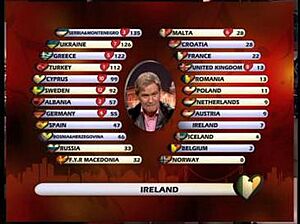
Since 2023, the voting system used to determine the results of the contest works on the basis of positional voting. Each country awards 1–8, 10 and 12 points to the ten favourite songs as voted for by that country's general public or assembled jury, with the most preferred song receiving 12 points. In the semi-finals, each country awards one set of points based primarily on the votes cast by that country's viewing public via telephone, SMS or the official Eurovision app, while in the final, each country awards two sets of points, with one set awarded by the viewers and another awarded by a jury panel comprising five music professionals from that country. Since 2023, viewers in non-participating countries are also able to vote during the contest, with those viewers able to cast votes via an online platform, which are then aggregated and awarded as one set of points from an "extra country" for the overall public vote. This system is a modification of that used since 1975, when the "12 points" system was first introduced but with one set of points per country, and a similar system used since 2016 where two sets of points were awarded in both the semi-finals and final. National juries and the public in each country are not allowed to vote for their own country, a rule first introduced in 1957.
Historically, each country's points were determined by a jury, consisting at various times of members of the public, music professionals, or both in combination. With advances in telecommunication technology, televoting was first introduced to the contest in 1997 on a trial basis, with broadcasters in five countries allowing the viewing public to determine their votes for the first time. From 1998, televoting was extended to almost all competing countries, and subsequently became mandatory from 2004. A jury was reintroduced for the final in 2009, with each country's points comprising both the votes of the jury and public in an equal split; this mix of jury and public voting was expanded into the semi-finals from 2010, and was used until 2023, when full public voting was reintroduced to determine the results of the semi-finals. The mix of jury and public voting continues to be used in the final.
Should two or more countries finish with the same number of points, a tie-break procedure is employed to determine the final placings. As of 2016[update] a combined national televoting and jury result is calculated for each country, and the country which has obtained more points from the public voting following this calculation is deemed to have placed higher.
Presentation of the votes
Since 1957, each country's votes have been announced during a special voting segment as part of the contest's broadcast, with a selected spokesperson assigned to announce the results of their country's vote. This spokesperson is typically well known in their country; previous spokespersons have included former Eurovision artists and presenters. Historically, the announcements were made through telephone lines from the countries of origin, with satellite links employed for the first time in 1994, allowing the spokespersons to be seen visually by the audience and TV spectators.
Scoring is done by both a national jury and a national televote. Each country's jury votes are consecutively added to the totals scoreboard as they are called upon by the contest presenter(s). The scoreboard was historically placed at the side of the stage and updated manually as each country gave their votes; in 1988 a computer graphics scoreboard was introduced. The jury points from 1–8 and 10 are displayed on screen and added automatically to the scoreboard, then the country's spokesperson announces which country will receive the 12 points. Once jury points from all countries have been announced, the presenter(s) announce the total public points received for each finalist, with the votes for each country being consolidated and announced as a single value. Since 2019, the public points have been revealed in ascending order based on the jury vote, with the country that received the fewest points from the jury being the first to receive their public points. A full breakdown of the results across all shows is published on the official Eurovision website after the final, including each country's televoting ranking and the votes of its jury and individual jury members. Each country's individual televoting points in the final are typically displayed on-screen by that country's broadcaster following the announcement of the winner.
Broadcasting
Participating broadcasters are required to air live the semi-final in which they compete, or in the case of the automatic finalists the semi-final in which they are required to vote, and the final, in its entirety; this includes all competing songs, the voting recap containing short clips of the performances, the voting procedure or semi-final qualification reveal, and the reprise of the winning song in the final. Since 1999, broadcasters who wished to do so were given the opportunity to provide advertising during short, non-essential hiatuses in the show's schedule. In exceptional circumstances, such as due to developing emergency situations, participating broadcasters may delay or postpone broadcast of the event. Should a broadcaster fail to air a show as expected in any other scenario they may be subject to sanctions by the EBU. Several broadcasters in countries that are unable to compete have previously aired the contest in their markets.
As national broadcasters join and leave the Eurovision feed transmitted by the EBU, the EBU/Eurovision network logo ident (not to be confused with the logo of the song contest itself) is displayed. The accompanying music (used on other Eurovision broadcasts) is the Prelude (Marche en rondeau) to Marc-Antoine Charpentier's Te Deum. Originally, the same logo was used for both the Eurovision network and the European Broadcasting Union, but they now have two different logos; the latest Eurovision network logo was introduced in 2012, and when the ident is transmitted at the start and end of programmes it is this Eurovision network logo that appears.
The EBU now holds the recordings of all but two editions of the contest in its archives, following a project initiated in 2011 to collate footage and related materials of all editions ahead of the event's 60th edition in 2015. Although cameras were present to practice pan-European broadcasting for the first contest in 1956 to the few Europeans who had television sets, its audience was primarily over the radio. The only footage available is a Kinescope recording of Lys Assia's reprise of her winning song. No full recording of the 1964 contest exists, with conflicting reports of the fate of any copies that may have survived. Audio recordings of both contests do, however, exist, and some short pieces of footage from both events have survived.
| Year | Venue | Broadcast viewing figures, all shows | Ref. |
|---|---|---|---|
| Eurovision 2007 | Helsinki, Finland | 106 million | |
| Eurovision 2008 | Belgrade, Serbia | 106 million | |
| Eurovision 2009 | Moscow, Russia | 124 million | |
| Eurovision 2010 | Oslo, Norway | 108.2 million | |
| Eurovision 2011 | Düsseldorf, Germany | 114.5 million | |
| Eurovision 2012 | Baku, Azerbaijan | 102.9 million | |
| Eurovision 2013 | Malmö, Sweden | 170 million | |
| Eurovision 2014 | Copenhagen, Denmark | 195 million | |
| Eurovision 2015 | Vienna, Austria | 197 million | |
| Eurovision 2016 | Stockholm, Sweden | 204 million | |
| Eurovision 2017 | Kyiv, Ukraine | 182 million | |
| Eurovision 2018 | Lisbon, Portugal | 186 million | |
| Eurovision 2019 | Tel Aviv, Israel | 182 million | |
| Eurovision 2020 | Not held due to COVID-19 | - | |
| Eurovision 2021 | Rotterdam, Netherlands | 183 million | |
| Eurovision 2022 | Turin, Italy | 161 million | |
| Eurovision 2023 | Liverpool, United Kingdom | 162 million |
Winners
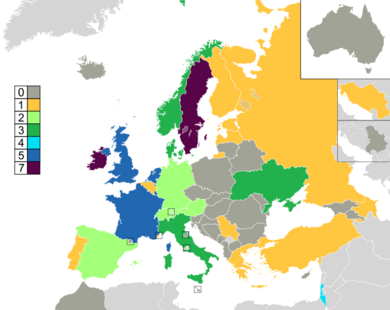
70 songs from 27 countries have won the Eurovision Song Contest as of 2023[update] Ireland and Sweden have recorded the most wins with seven each, followed by France, Luxembourg, the United Kingdom and the Netherlands with five each. Of the 52 countries to have taken part, 25 have yet to win. On only one occasion have multiple winners been declared in a single contest: in 1969, four countries finished the contest with an equal number of votes and due to the lack of a tie-break rule at the time, all four countries were declared winners. A majority of winning songs have been performed in English, particularly since the language rule was abolished in 1999. Since that contest, seven winning songs have been performed either fully or partially in a language other than English.
Two countries have won the contest on their first appearance: Switzerland, by virtue of being declared the winner of the first contest in 1956; and Serbia, which won in 2007 in its first participation as an independent country, following entries in previous editions as part of the now-defunct Yugoslavia and then Serbia and Montenegro. Other countries have had relatively short waits before winning their first contest, with Ukraine victorious on its second contest appearance in 2004 and Latvia winning with its third entry in 2002. Conversely, some countries have competed for many years before recording their first win: Greece recorded its first win in 2005, 31 years after its first appearance, while Finland ended a 45-year losing streak in 2006. Portugal waited the longest, recording its first win in 2017, 53 years after its first participation. Countries have in the past had to wait many years to win again: Switzerland went 32 years between winning in 1956 and 1988; Denmark held a 37-year gap between wins in 1963 and 2000; the Netherlands waited 44 years to win again in 2019, its most recent win having been in 1975; and Austria won its second contest in 2014, 48 years after its first win in 1966.
The United Kingdom holds the record for the highest number of second-place finishes, having finished runner-up sixteen times. Meanwhile, Norway has come last more than any other country, appearing at the bottom of the scoreboard on eleven occasions, including scoring nul points four times. A country has recorded back-to-back wins on four occasions: Spain recorded consecutive wins in 1968 and 1969; Luxembourg did likewise in 1972 and 1973; Israel in 1978 and 1979; and Ireland became the first country to win three consecutive titles, winning in 1992, 1993 and 1994. Ireland's winning streak in the 1990s includes the 1996 contest, giving it a record four wins in five years.
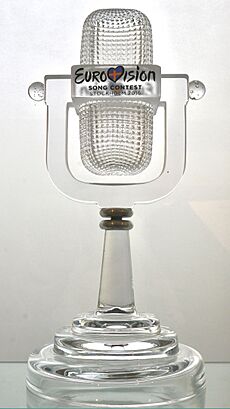
The winning artists and songwriters receive a trophy, which since 2008 has followed a standard design: a handmade piece of sandblasted glass with painted details in the shape of a 1950s-style microphone, designed by Kjell Engman of the Swedish-based glassworks Kosta Boda. The trophy is typically presented by the previous year's winner; others who have handed out the award in the past include representatives from the host broadcaster or the EBU, and politicians; in 2007, the fictional character Joulupukki (original Santa Claus from Finland) presented the award to the winner Marija Šerifović.
Cultural influence
The Eurovision Song Contest has amassed a global following and sees annual audience figures of between 100 and 600 million. The contest has become a cultural influence worldwide since its first years.
Eurovision has a large online following and multiple independent websites, news blogs and fan clubs are dedicated to the event. One of the oldest and largest Eurovision fan clubs is OGAE, founded in 1984 in Finland and currently a network of over 40 national branches across the world. National branches regularly host events to promote and celebrate Eurovision, and several participating broadcasters work closely with these branches when preparing their entries.
Images for kids
-
Lys Assia, the winner of the first Eurovision Song Contest in 1956, performing at the 1958 contest
-
The opening act during the final of the 2011 contest in Düsseldorf, Germany
-
The EuroClub at the 2012 contest in Baku, Azerbaijan
-
After winning the 1974 contest with the song "Waterloo", the Swedish pop group ABBA became one of the most commercially successful acts in the history of pop music.
-
Destiny Chukunyere won the 2015 edition of the Junior Eurovision Song Contest for Malta
-
Hosts Graham Norton and Petra Mede during the Eurovision Song Contest's Greatest Hits, a special event marking the contest's 60th anniversary
See also
 In Spanish: Festival de la Canción de Eurovisión para niños
In Spanish: Festival de la Canción de Eurovisión para niños


